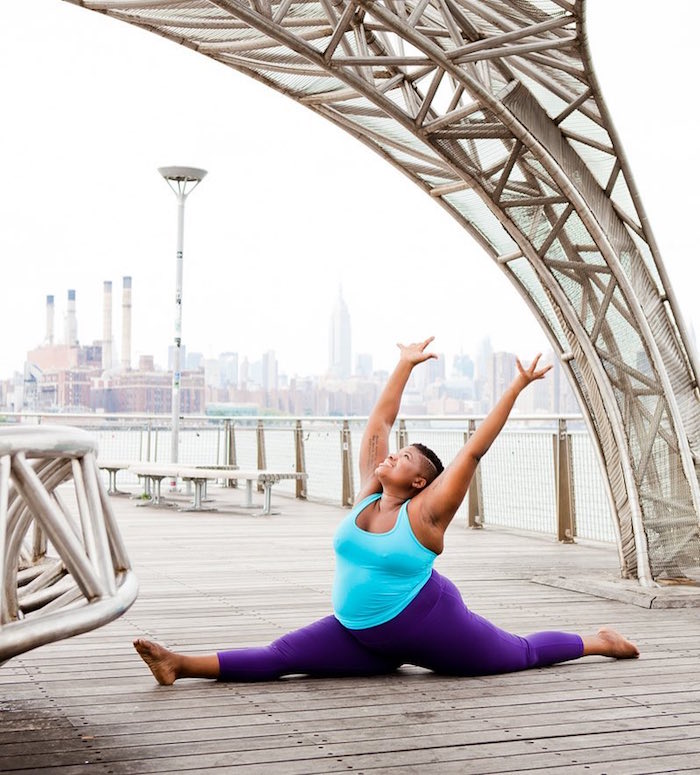Jessamyn Stanley, Self-Described "Fat Femme" Yogi, Talks Confidence and Identity
Photo: Courtesy of @mynameisjessamyn
Jessamyn Stanley did not start out with aspirations of becoming a yoga instructor. Six years ago, the North Carolina native was in graduate school, practicing the occasional yoga pose at home. She began snapping photos of herself to see if she was doing the poses right, and eventually started uploading them to Instagram.
It was a side hobby, at first. Yet the image of a confident, full-figured black woman bending and twisting into intricate poses — no airbrushing, no Lululemon gear, no pricey yoga mat (in fact often it was simply a bath towel) — struck a nerve, and soon Jessamyn had amassed a loyal following. Now a full-time yoga instructor and body positivity advocate, the self-described “fat femme” is also an author, of the new book, Every Body Yoga: Let Go of Fear, Get on the Mat, Love Your Body.
You self-identify as a “fat femme.” What does that mean?
It’s always funny to me that that is even disarming to people. To me, it’s a statement of fact. I am fat. If you look it up in the dictionary, I match the definition. I think when people think of the word “fat,” they think ugly and stupid and not worthwhile. And so it’s confusing when someone owns that word. That’s a result of a whole wave of discrimination of fat-bodied people. It’s definitely something that I’ve had to come to terms with it over time. And I’m a queer femme. It’s really important to me to own femme publicly. Being femme makes it very easy for people to read you as straight-passing. As an exercise to myself, I don’t want to be straight passing. I always want to state my identity for myself, so that I own it and so that there’s no confusion.
You began practicing yoga in graduate school. Did you take to it immediately?
It’s important for me to say that it was very hard my first time. It’s not like I started and was magically so great at it. One of the problems with social media is that people see these pictures of poses and they’re thinking, “If you can do these really hard poses you’re really good at yoga.” But the purpose of yoga is to look into to yourself and have a dialogue. I practice it in the same way I take vitamins, shower, and wash my hair: It’s a form of self-care. It’s to take care of my body and spirit and emotions and always remember who I truly am when the world is spinning.
Photo: Courtesy of @mynameisjessamyn
Your book, Every Body Yoga, came out this past April. Why did you decide to write a book at all?
I wrote it because I received so many messages asking me “How did you start practicing yoga?” and “How can I start practicing today?” And every time I get a message like that I’m thinking, “Why the fuck are you asking me? There’s Google.” But then I’d google it and I’d be like, “This is so confusing. Is it a religion? Is it exercise? Why are there so many kinds? Is it just for thin white women?”
I realized I just need to write it all down so that I only have to answer it once. It’s a book for readers already doing yoga, looking to refresh their practice or find new ways to stay motivated. It’s for people who range in size, color, and gender expression.
Photo: Courtesy of @mynameisjessamyn
Have you always felt confident in your body or was that a process for you?
I learned from a young age to be hateful to myself. When I started practicing yoga at home, I would take photos of myself to see how my practice looked. And then, I realized that what I would write to go along with my photos would be so hateful and awful towards myself. I was thinking, “Where was that coming from? Why do you feel compelled to write this about yourself?” It’s something I constantly have to remind myself not to do. It forced me to have conversations with myself that most people don’t usually have. That process is not fun or easy. Yoga can breed so many negative feelings within the self. But yoga is a much bigger concept than the body. For me, it’s really about making myself see the truth.
You’ve talked about the benefits of asking yourself “How Do I Feel?” rather than “How Do I Look?” What does that mean?
I realized how much easier it is to ask others “How do I look?” than to ask ourselves “How do I feel?” We’re socialized to think that how we feel is less important than how someone else feels about us. At the end of the day, you come in alone and you go out alone. If you feel good, you look good. The way you look good and confident is by really feeling good. If you don’t feel yourself, then who else will? You gotta ask yourself “How do I feel?” always.
Love,
Sharona Attia for The BeeHive



